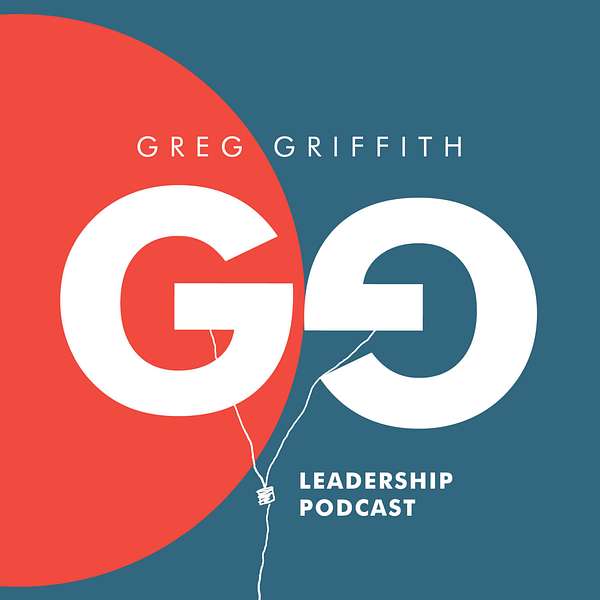
Beyond Sunday
Beyond Sunday is a podcast where we dive into what our Church is up to, what's happening in society, go deeper into topics from Sunday mornings, and hear leadership talks and coffee break theology from Pastor Greg Griffith. This is a podcast of King of Kings Church in Omaha & Fremont, Nebraska. Learn more at kingofkings.org.
Beyond Sunday
Taking Small Steps
This leadership episode is all about action, are you ready to take those small yet crucial steps toward your ambitions? Learn how to face struggles, remain focused, and make each step count towards your larger goals. Let's begin achieving our goals, one small step at a time.
Stay up to date by following us on your favorite social networks.
Facebook | Instagram | Twitter | YouTube
Have questions or comments? Email us at contact@kingofkings.org.
Thanks for listening!
Welcome to this month's Greg Griffith Leadership Podcast. Join Greg Griffith as we together learn what it means to be leaders of our world as we faithfully love and faithfully lead. Like, share, rate and review this podcast with your friends and others of influence, for they too are looking for people like you to help them lead and love day to day. What further do you hear as your host?
Speaker 2:Greg Griffith. Hey everybody, thanks so much and welcome back to Greg Griffith. Leads and I love leading together because I know that as we are faithfully leading, we are faithfully living and thus faithfully loving Leaders. I want to share with you today a topic that I think is so important that we oftentimes miss, and that topic is taking small steps. What I oftentimes see, what I did and what I am reminded about, is the fact that small steps are necessary in order to achieve large leaps. We know this If you have ever seen the picture of I believe it's Neil Armstrong on the moon saying one small step for mankind, one large leap for man, right, and so these are big deals for us. I also love the saying don't despise small beginnings and don't overlook small steps. Let me tell you from a personal side and then let that lead into a leadership of an organization or of your own family side.
Speaker 2:So one of the things that has been important for me is to be at a healthy lifestyle and more importantly and specifically means have a healthy weight, and my weight has gone up and down, up and down, and at times it's been to where I was just completely unhealthy in a weight, and that's because I stopped doing small steps, and a couple of things I always want to remember, and I still remind myself, even to this day, is first of all, it is so important for me to have a goal, but that goal can't be something that I just say in my head. I can't just say I just wish I was a certain weight or I wish I were more healthy. I actually have to write it down, and so annually, every year, I write down what I want my target weight to be. The second piece of that is why it's so important for us to write the goal down is because once we write it down, it actually moves from being a dream into being a goal. Anything that we have not written down is just a desire, a wish or a dream, and those aren't bad things, but they're not goals. So understand that. The second piece is so then, what are my small steps to achieve that goal? I can't say I want to lose 20 pounds for the year if I don't have steps for that to happen. Now here's the first hurdle. I can always rationalize starting tomorrow, matter of fact, I'll tell you. Every single day when I wake up, I think ah, yeah, you know what. I'll start tomorrow, I'll start the workout regime tomorrow. I've had a lot of tomorrows that became tomorrow, so don't start with tomorrow, start with today.
Speaker 2:I believe it was James Clear who said if your goal is to get to a gym, to build the habit in order to get to that gym, begin by just simply waking up at the time. You need to wake up to go to the gym and do that for a week. The next week wake up at that time, your body's into the rhythm and the routine and now just get workout clothes on and drive to the gym. The next week, get up, get clothes on, drive to the gym and just go inside. The next week, drive, get up, get up, drive, go inside and now work out for just a few minutes. Build small steps of habits, of routine, in order to get to where your mind is now working with your goals and your body.
Speaker 2:The other thing to do is share those goals. Don't have this goal be a secret. It is so important to tell others. So I say to my wife here's what I want to weigh. Hold me accountable that I don't want to eat sugar. Hold me accountable to getting up and getting out of bed. I tell other people. I post it on my social media feeds. I let people know what I'm doing. Here's the other piece I let people know when I struggle. I promise you, whatever goal you have, you will have moments where you struggle with it. It is so important for you to say I'm struggling, I need help. Someone encourage me and watch a crowd of fans tell you you can do this. It's so vital. And that allows you to have some accountability right Not to have shame or guilt, but to say I have people that I've asked to help me in this journey and so they're there with you. That's a good accountability.
Speaker 2:Now let's take these steps personally and apply them to your life organizationally. Some of you that are listening to this are a pastor of a large church or a church. Some of you that are listening to this are a ministry in churches. Some of you that are listening to this are people that have jobs, or are people that just simply attend our church or are around our country. So I want you to now apply this in the area that you want to see growth in your life. Maybe that's in your family, maybe that's in your job, maybe that's in your vocation or your ministry, maybe that's in your personal hobbies, whatever it may be. Maybe it's in your personal life individually.
Speaker 2:What I want you to do is I want you to write one goal down. And here's the other thing I would say don't fill a goal sheet and have 40 goals that looks really great on paper but you'll never accomplish it. Wouldn't it be better to have one goal and accomplish just one goal, rather than have three goals and get one done? So start small and just build up. Take the small step each and every day. So maybe you have a goal that you're saying as a leader I this year, want to meet a hundred new people. Okay, first thing to do, ask yourself the question is that a realistic goal? Can I meet a hundred new people? Okay? So let's pretend that you do that and you say, no, that's not realistic. So now break it down and go. Let's do 36 new people. I want to meet 36 new people this year. Now define what does meet mean. Does it mean just simply know their name? Does it mean just an introduction? Or does it mean know them in some way, have a relationship with them, know something about them, what they do, who their children are, who their spouse is? Then break that further down. What does that mean? Well, if I want to meet 36 new people over this year, that means I need to meet three people per month. That's less than one person a week. If I want to meet three people per month, where and how am I going to meet these three people per month?
Speaker 2:Evaluate and look at your rhythms and your routines. What day do you go grocery shopping? Maybe you say I go all sorts of days. Well, maybe you say now I'm going to go grocery shopping on Tuesdays and I'm only going to use the lane number three. That's always open and it's the same person who's there and I'm going to meet them. Maybe you say I go out to eat with my family one night a week and you say on the third week of every month we're going to go to the same restaurant and we're going to ask to sit in the same server section and we're going to get to know that server.
Speaker 2:Maybe as you walk to your job and your office or your cubicle, you pass by someone every single time and you've just said hey and you just know their name's Kevin. And maybe you say I'm going to stop once a week at their cube and say to Kevin how are you doing today? I'm good. What's been good about your day? My wife made her famous meatloaf sandwich. She says, oh, you're married. What's her name?
Speaker 2:Small steps and small goals to make a large leap to meet 36 new people. What I want to encourage you to do, leaders, is to look at where you want to go in your life or your organization and to then put together the small steps and routines to achieve that goal. And as you do it, as it's written down and as you hold yourself accountable, you're going to realize this is so much easier. Let me do one more really quickly. Maybe you're saying I want to read 12 books this month or this year. That's one book a month.
Speaker 2:Now, don't limit yourself.
Speaker 2:I want to read 12 books. Maybe you say I can do audible. That's reading 12 books. So if you do 12 audible books, then you figure out how to do that. Maybe you're saying I like the old fashioned of just pick up, read and mark the pages. That's fine. Then say I'm going to read one chapter a day. I'm going to read one page a day, whatever it is. Write the goal down and then make your plan and you will get where you want to go. Leaders, here's the good news that I know, as we organizationally, as we personally, set goals for where we want to go, these small little steps will be large leaps for us to make an impact in whatever God has positioned and purposed us. So I want to say thanks so much for listening today to this podcast. I want to invite you to like, share, rate and review this podcast and get it into someone's friend, and I want to invite you to continue to faithfully lead as you're faithfully loving and faithfully living today, tomorrow and forever. Have a great day, leaders, thanks so much.
Speaker 1:Thank you for being a part of this month's Greg Griffith Leadership Podcast. Join Greg next month for leadership insights to faithfully love and faithfully lead. Now go beat a rhythm today.
Podcasts we love
Check out these other fine podcasts recommended by us, not an algorithm.
